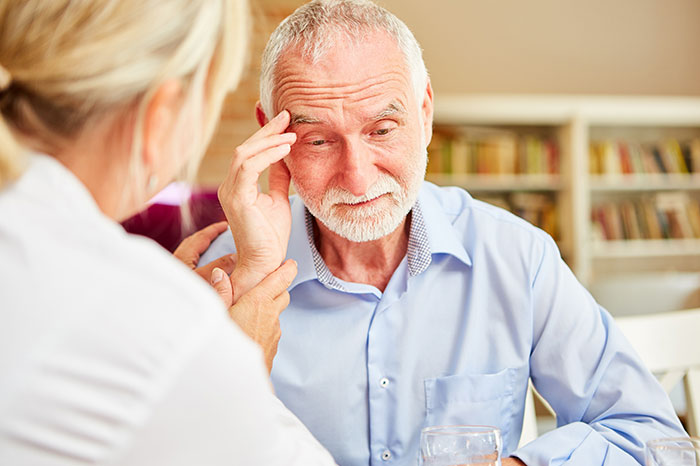All About Alzheimer’s
September is World Alzheimer’s Month, with World Alzheimer’s Day itself taking place on the 21st. With that in mind, this is everything you need to know about Alzheimer’s Disease.
20/09/2021
September is World Alzheimer’s Month, with World Alzheimer’s Day itself taking place on the 21st. With that in mind, this is everything you need to know about Alzheimer’s Disease.
What is Alzheimer’s Disease?
You may have heard the words dementia and Alzheimer’s used interchangeably as if they are the same thing. In fact, Alzheimer’s is a type of dementia.
We’ve covered the key myths about dementia at length in a recent blog, but it’s important to note that dementia isn’t a disease in itself. It’s actually a term for a cluster of symptoms that show someone’s brain is being affected in a troubling way.
Dementia affects around one in six people over the age of 80 in the UK. Being the most common form of dementia, Alzheimer’s accounts for around two-thirds of those cases – meaning it affects over 500,000 people in Britain alone. Only 5% (or 42,000) of those are under 65, living with what’s known as early-onset Alzheimer’s.
Everything you need to know about the causes of Alzheimer’s Disease
The human brain naturally shrinks and changes as it ages – but Alzheimer’s causes changes outside the scope of natural ageing.
The full causes aren’t yet known, which is why so much money goes into research to understand the condition. However, it’s believed that some people develop a build-up of the proteins amyloid and tau, which over time grow to damage brain cells. This ends up causing the first symptoms of Alzheimer’s, which later progress into ones that are more noticeable and serious.
Symptoms of Alzheimer’s

Here, we’ll look at everything to know about Alzheimer’s symptoms.
The early ones include:
- Often forgetting people’s names and faces along with events of recent hours, days or weeks
- Repeating questions, behaviours or tasks
- Misplacing items or putting them in unusual places where they don’t belong
- Being confused about simple things like the day or time
- A general sense of disorientation and easily getting lost
- Difficulty expressing oneself and not being able to remember the right words
- Low mood, low confidence or a general sense of malaise or apathy towards the world around the sufferer.
Longer-term, people living with Alzheimer’s tend to develop many (if not all) of the following symptoms:
- Memory noticeably worsens
- Communication becomes unmistakably difficult
- Recognising people or even household objects becomes difficult
- Simple day-to-day tasks around the house become much harder to do
- Erratic sleep patterns
- Depression, sadness, frustration and fearfulness can take hold
- Physical problems can include issues walking and swallowing
- The mind can also play tricks on people with late-stage Alzheimer’s, leading to hallucinations (seeing things that aren’t there) or delusions (believing in events that haven’t happened).
Alzheimer’s is a progressive illness, meaning it gets worse over time. It’s therefore no wonder that those with a diagnosis of Alzheimer’s will need more and more care as the disease enters its final stages.
Diagnosing Alzheimer’s

At present, nobody can diagnose Alzheimer’s (or any other form of depression) with 100% accuracy. However, if your GP suspects you or a loved one may be experiencing early Alzheimer’s symptoms, they are likely to ask some questions (of both you and/or someone close to you) about how your symptoms affect you day-to-day.
If needed, they may then refer you for tests. These can include:
- A full physical check
- Pen and paper tasks to test your memory
- Blood tests
- Brain scans
- And possibly a lumbar puncture, where a surgeon takes a sample of blood from the spine to test for amyloid and tau proteins.
The results of these tests may be inconclusive or lean strongly towards an Alzheimer’s diagnosis. If the former, you or a loved one may need to repeat them in future, especially if the symptoms mentioned above worsen.
Treating Alzheimer’s
We committed to covering everything you need to know about Alzheimer’s Disease, and that includes treatments – of which thankfully there are now many.
While none of them will actively slow or stop the disease from progressing, they can often create the illusion of it by making the symptoms of Alzheimer’s less pronounced and less damaging to a sufferer’s daily life.
Alzheimer’s-specific medications
Prescribed by a GP with guidance from a specialist, there are several different drugs that can help to treat Alzheimer’s symptoms.
- Mild to moderate symptoms can be managed by donepezil (Aricept), rivastigmine (Exelon) and/or galantamine (Reminyl). They belong to a group of medications known as cholinesterase inhibitors which work by increasing the amount of a chemical called acetylcholine which helps messages travel around the brain.
- More severe symptoms can be managed using Memantine (Ebixa or Axura) which regulates the chemical glutamate to help nerve cells communicate with each other. Memantine can also be given to people with lesser-pronounced symptoms who get no benefit from the medications mentioned above.
Additional treatments
There are also additional medication and non-medication treatments, plus environmental aids, for Alzheimer’s disease. These can include:
- Group activities to stimulate the brains of sufferers, talking
- Talking therapies to treat those experiencing low mood and depression
- Reviewing and adjusting the sufferer’s environment to remove painful emotional triggers
- Complementary therapies like dance or aromatherapy
- Plus, in some cases, antidepressants or antipsychotic drugs might be used to relieve symptoms if a person with Alzheimer’s is especially angry or sad.
The prognosis for families

Alzheimer’s does tend to run in families, but there are no guarantees you will develop it just because older relatives have. In truth, we won’t know all about Alzheimer’s that we’d like to. The exact reasons some people get the disease and others don’t will remain a secret until scientific research makes significant progress. And due to the very nature of that process, nobody is sure how long that might take or what the results will tell us.
However, while you cannot predict whether or not you might develop Alzheimer’s (or another form of dementia), there are certain things you can do to help reduce the chances. These involve living a healthy and reasonably active lifestyle, eating a balanced diet, and having a connected and supportive social and/or family life, along with hobbies that together help to keep your mind young and your senses sharp.
Alzheimer’s support – for sufferers, and carers
Alzheimer’s is a long-term condition for which there is no cure – but for which there is hope. Early diagnosis, myriad treatment options and a growing understanding in both the medical and broader communities mean that those with an Alzheimer’s diagnosis can still lead fun, fulfilling and rich lives feeling connected to those they love.
At the same time, this is a progressive illness and one for which additional help is available.
Amongst them are our specialist domiciliary care (home care), live-in care, and respite care services. They offer three different ways to get the extra support and care that you or a loved one needs – whether it’s visiting several times a day, having someone there round the clock, or giving a family member or loved one the break they need to refresh and renew.
With each service, you’ll find our staff are friendly, professional and fully trained to help someone experiencing the symptoms of Alzheimer’s Disease.
To find out more, call us on 01903 730026 or visit our contact page and drop us a line.

